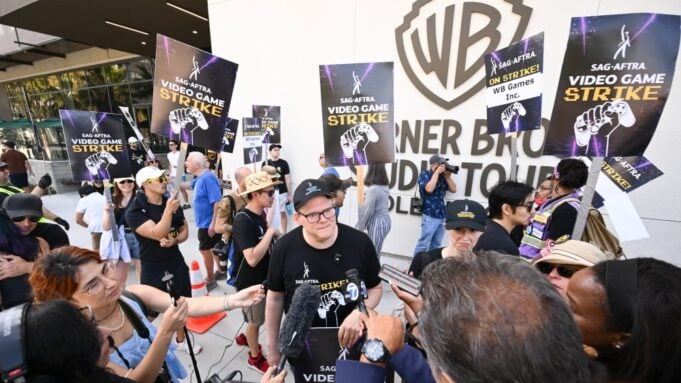In a replay of last year’s strike, some 500 actors picketed Thursday outside WB Games in Burbank, demanding protection from artificial intelligence.
SAG-AFTRA, which represents voice and motion capture performers in video games, declared a strike last week after 18 months of negotiations. The strike hinges on a single issue: consent and compensation for the use of AI replicas.
“They’re calling the information data — our movement, our voice, the way we talk,” said Ted Evans, a voice actor on the picket lines. “For them, it’s just data. For us, it’s our hopes and dreams and life purposes… It’s basically taking everything we have and throwing us in the garbage.”
AI was also a central theme of last year’s film and TV strike. In the end, the union won robust protections over the use of an actor’s likeness, but few limits on creation of “synthetic” actors that do not resemble anyone in particular.
Duncan Crabtree-Ireland, the union’s chief negotiator, said the video game publishers have yet to agree to the restrictions that have been accepted by studios and streamers.
“Just like last year, we didn’t come into this saying, ‘Ban AI,’” he said. “Our members have been working with AI in certain ways. The companies want to expand upon that. And that is something we’re willing to do with protections in place.”
The video game companies have said their most recent offer, delivered a day before the strike began, includes consent and compensation for all performers working under the contract.
“These terms are among the strongest in the entertainment industry,” said Audrey Cooling, a spokesperson for the companies, in a statement last week.
Union leaders disagree with that characterization, saying the company’s proposed AI protections leave out certain categories of performers. Ray Rodriguez, the union’s chief contracts officer, said the protections for on-camera performers apply only to those whose image is recognizable as that performer.
“That doesn’t happen in video games, right?” he said. “You’re providing the stunt work for a zombie — you’re not going to look like that zombie hopefully.”
They also fear that the the video game companies will be able to use an actor’s previous performances to create synthetic characters.
“The way they’ve written it right now is that you could prompt anyone based on any of the characters they’ve done in the history of their career to recreate their performance,” said Sarah Elmaleh, chair of the union’s negotiating committee.
Unlike last year, the union is not planning to picket in person every day. Instead, it will be looking for other ways to draw attention to the strike, particularly online. SAG-AFTRA last went on strike against the video game companies in 2016, over the issue of residuals. That strike lasted nearly a year.
Crabtree-Ireland said he believes that the companies will feel pressure from Wall Street and the general public to come to a quicker resolution this time.
“I think the pressure on these companies is gonna be way greater because people say, ‘Why can’t you treat your workers fairly as it relates to AI?’” he said. “All of us want that — not just actors, not just people in the entertainment industry. Every worker in this country wants to be treated fairly with respect to AI.”
Some of the leaders of last year’s Writers Guild of America and SAG-AFTRA strikes were on hand Thursday as well.
“They’re just trying to find as many loopholes as they can,” said Frances Fisher, a member of the SAG-AFTRA negotiating committee in last year’s strike. “There’s a lot of shenanigans going on.”
From Variety US
































